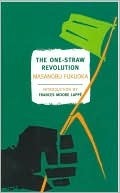More on this book
Community
Kindle Notes & Highlights
It was 1970, and the extent to which our species—supposedly the most intelligent—had failed as steward of the planet had only begun to sink in on me. At age twenty-six, in my first big “ah-ha” moment, I was struck by the realization that we humans had actively created the food scarcity we claimed to fear. We were (and still are) feeding more than a third of the world’s grain to livestock, which return to us only a fraction of those nutrients.
Fukuoka taught that the best methods of food cultivation are those aligned with nature, which on a practical level means minimal soil disruption (no tilling or weeding) and no application of chemicals (be they fertilizers or pesticides).
is to warn us of our proper place in the order of things: we did not make either the world or ourselves; we live by using life, not by creating it.
“When it is understood that one loses joy and happiness in the effort to possess them, the essence of natural farming will be realized.”
“The ultimate goal of farming,” Mr. Fukuoka says, “is not the growing of crops, but the cultivation and perfection of human beings.”
All three methods (natural, traditional, and chemical) yield comparable harvests, but differ markedly in their effect on the soil. The soil in Mr. Fukuoka’s fields improves with each season. Over the past twenty-five years, since he stopped plowing, his fields have improved in fertility, structure, and in their ability to retain water. By the traditional method the condition of the soil over the years remains about the same. The farmer takes yields in direct proportion to the amount of compost and manure he puts in. The soil in the fields of the chemical farmer becomes lifeless and depleted of
...more
Mr. Fukuoka believes that natural farming proceeds from the spiritual health of the individual. He considers the healing of the land and the purification of the human spirit to be one process, and he proposes a way of life and a way of farming in which this process can take place.
To “understand nothing,” in this sense, is to recognize the insufficiency of intellectual knowledge.
The reason that man’s improved techniques seem to be necessary is that the natural balance has been so badly upset beforehand by those same techniques that the land has become dependent on them. This line of reasoning not only applies to agriculture, but to other aspects of human society as well. Doctors and medicine become necessary when people create a sickly environment. Formal schooling has no intrinsic value, but becomes necessary when humanity creates a condition in which one must become “educated” to get along.
But all I have been doing, farming out here in the country, is trying to show that humanity knows nothing.
Nature does not change, although the way of viewing nature invariably changes from age to age.
the world has become so specialized that it has become impossible for people to grasp anything in its entirety.
But I think an understanding of nature lies beyond the reach of human intelligence.
Natural farming takes a distinctive form in accordance with the unique conditions of the area in which it is applied.
Ultimately, it is not the growing technique which is the most important factor, but rather the state of mind of the farmer.
Before researchers become researchers they should become philosophers. They should consider what the human goal is, what it is that humanity should create. Doctors should first determine at the fundamental level what it is that human beings depend on for life.
A scientific testing method which takes all relevant factors into account is an impossibility.
There was one great problem, however. If crops were to be grown without agricultural chemicals, fertilizer, or machinery, the giant chemical companies would become unnecessary and the government’s Agricultural Co-op Agency would collapse.
So it appears that government agencies have no intention of stopping pollution. A second difficulty is that all aspects of the problem of food pollution must be brought together and solved at the same time. A problem cannot be solved by people who are concerned with only one or another of its parts.
No matter how hard people try, they cannot improve upon naturally grown fruits and vegetables. Produce grown in an unnatural way satisfies people’s fleeting desires but weakens the human body and alters the body chemistry so that it is dependent upon such foods.
If we do have a food crisis it will not be caused by the insufficiency of nature’s productive power, but by the extravagance of human desire.
I do not particularly like the word “work.” Human beings are the only animals who have to work, and I think this is the most ridiculous thing in the world. Other animals make their livings by living, but people work like crazy, thinking that they have to in order to stay alive. The bigger the job, the greater the challenge, the more wonderful they think it is. It would be good to give up that way of thinking and live an easy, comfortable life with plenty of free time. I think that the way animals live in the tropics, stepping outside in the morning and evening to see if there is something to
...more
Food is a gift of heaven. People do not create foods from nature; heaven bestows them.
People struggle hard to understand, convince themselves that they understand, and die knowing nothing.
It is said that there is no creature as wise as the human being. By applying this wisdom, people have become the only animals capable of nuclear war.
“Why do you have to develop? If economic growth rises from 5% to 10%, is happiness going to double? What’s wrong with a growth rate of 0%? Isn’t this a rather stable kind of economics? Could there be anything better than living simply and taking it easy?”


